|
|
|
Sort Order |
|
|
|
Items / Page
|
|
|
|
|
|
|
| Srl | Item |
| 1 |
ID:
135096
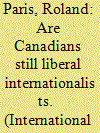

|
|
|
|
|
| Summary/Abstract |
Since coming into office in 2006, the government of Prime Minister Stephen Harper has rejected many of the symbols and practices of the liberal internationalist approach to foreign affairs that Canadian governments of all political stripes broadly embraced during the preceding six decades. As part of this change, the Harper government has also promoted a new narrative about Canada’s history and foreign policy, which encourages Canadians to change how they think about their country and its role in the world. By examining recent opinion surveys, this article asks whether Canadian public attitudes on foreign policy have shifted away from liberal internationalism and toward the Harper government's narrative since 2006.
|
|
|
|
|
|
|
|
|
|
|
|
|
|
|
|
| 2 |
ID:
111973


|
|
|
|
|
| Publication |
2012.
|
| Summary/Abstract |
This article argues that neo-Gramscian theorizations of "hegemony" have failed to illuminate the role of nineteenth-century Britain in the rise of a liberal world economy in three respects. First, they have provided mutually exclusive accounts of the social forces underpinning domestic and international hegemony. Second, they have failed to show Britain's agency in the making of a liberal world order. Third, they have posited a uniformity of social forces and liberal state forms that elides the differences between British and continental societies, thereby obscuring the real reasons for the general shift to liberal internationalism. We argue that it was the structural differences in the economic, social, and political organization of Britain and continental Europe that made free trade without a hegemon possible. Neo-Gramscian theorists of hegemony-just like their mainstream peers-have unduly generalized from the unique structures of American hegemony after 1945. Instead of serving as a master concept to organize the history of international relations, hegemony itself needs to be historicized: as a singular and temporally limited possibility of societal and international rule, preceded and succeeded by other forms.
|
|
|
|
|
|
|
|
|
|
|
|
|
|
|
|
| 3 |
ID:
113173
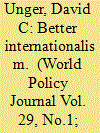

|
|
|
|
|
| Publication |
2012.
|
| Summary/Abstract |
Genoa-Internationalism has many different meanings, but constructive global citizenship should always be at its core. An internationalist foreign policy for the developed countries would use their wealth, economic might, and military power to promote a better, more peaceful, more prosperous world for everyone.
|
|
|
|
|
|
|
|
|
|
|
|
|
|
|
|
| 4 |
ID:
105372
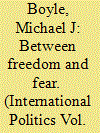

|
|
|
|
|
| Publication |
2011.
|
| Summary/Abstract |
Why have two successive US administrations concluded that fighting terrorism must involve democracy promotion? This assumption became prevalent in US political discourse following the events of September 11 despite the fact that the empirical evidence linking democracy and terrorism is weak or ambiguous. More strikingly, it has persisted even after the missions to establish democracies in Afghanistan and Iraq have led to increasing violence, including a worldwide increase in terrorist attacks. This article argues that the link between democracy and terrorism was established by the combined effect of three factors: (a) the framing of the September 11 attacks in a way that increased the receptivity to this conceptual opposition between freedom and fear; (b) the ideological influence of the Wilsonian tradition, as manifested today in an unusual consensus between modern neo-conservatives and liberal internationalists on the desirability of democratic reform as a means of changing foreign policy behaviour; and (c) a powerful bipartisan domestic constituency in favour of democracy promotion. Owing to these three factors, the contraposition of democracy and terrorism in American political discourse is effectively over-determined because it mirrors the dominant ideological and political preferences of American elites. This fixed preference for democracy promotion explains why the Obama Administration has remained wedded to the binary distinction between freedom and fear in its public statements despite its efforts to break in style and substance with the policies of its predecessor.
|
|
|
|
|
|
|
|
|
|
|
|
|
|
|
|
| 5 |
ID:
097755
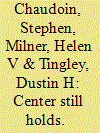

|
|
|
|
|
| Publication |
2010.
|
| Summary/Abstract |
Recent research, including an article by Charles Kupchan and Peter Trubowitz in this journal, has argued that the United States' long-standing foreign policy orientation of liberal internationalism has been in serious decline because of rising domestic partisan divisions. A reanalysis of the theoretical logic driving these arguments and the empirical evidence used to support them suggests a different conclusion. Extant evidence on congressional roll call voting and public opinion surveys, which is often used to support the claim that liberal internationalism has declined, as well as new evidence about partisan divisions in Congress using policy gridlock and cosponsorship data from other studies of American politics do not demonstrate the decline in bipartisanship in foreign policy that conventional wisdom suggests. The data also do not show evidence of a Vietnam War or a post-Cold War effect on domestic partisan divisions on foreign policy. Contrary to the claims of recent literature, the data show that growing domestic political divisions over foreign policy have not made liberal internationalism impossible. It persists as a possible grand strategy for the United States in part because of globalization pressures.
|
|
|
|
|
|
|
|
|
|
|
|
|
|
|
|
| 6 |
ID:
098459
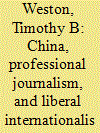

|
|
|
|
|
| Publication |
2010.
|
| Summary/Abstract |
This article shows that Chinese sensitivity about the way the Western press covers China, a point of obvious relevance today, has a lengthy and rich history. The article focuses on the movement to professionalize Chinese journalism in the late 1910s and early 1920s and on ways in which that movement was bound up in a transnational conversation about journalism reform, as well as in educational institution-building efforts, that flowed from the United States to East Asia. Concentrating on linkages between China, the United States and Japan, the article argues that the effort to transfer American journalistic norms to China was undercut both by the Western-dominated political and economic forces that shaped the flow of information in the world at the time, and by the failure of Western journalism to live up to its own standards insofar as its coverage of China was concerned. Given the rising nationalism in China at that time, such problems proved very consequential. These conclusions are based on an analysis in the last section of the article of Chinese participation in the Press Congress of the World meeting convened in Honolulu, Hawai'i, in 1921. The Chinese who attended that meeting were among the most Westernized and self-consciously professional journalists in China and, as such, were in a unique position to critique Western journalism practice in China on its own terms.
|
|
|
|
|
|
|
|
|
|
|
|
|
|
|
|
| 7 |
ID:
174070
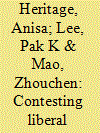

|
|
|
|
|
| Summary/Abstract |
As the introduction to the special issue on 'Contesting liberal internationalism: China's renegotiation of world order', this paper outlines the theoretical framework of the special issue, namely international order and order contestation, and the main arguments of the four papers included in this special issue. Recently, a, albeit not the, key challenge to the liberal international order stems from the leadership aspirations of non-Western, non-liberal states, and their increasing demand for a greater voice, most notably China under the leadership of Xi Jinping. This special issue is constructed as a debate concerning the alleged challenges posed by China to both the political and economic spheres of the liberal international order. The four case studies and papers are grouped into two core themes: the impact of China's state-capitalist development model and practices on the liberal economic order, and China's attempts to transform norms and rules in security-related matters. The four papers aim to appraise Chinese discursive narratives and practices that would collectively challenge American liberal hegemony. Altogether they argue that a hybrid of order-building norms and practices is likely to co-exist alongside the prevailing liberal international order.
|
|
|
|
|
|
|
|
|
|
|
|
|
|
|
|
| 8 |
ID:
164366
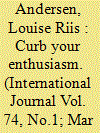

|
|
|
|
|
| Summary/Abstract |
The future looks post-Western. But will it also be post-liberal? To gauge how and by whom liberal internationalism may be sustained in the coming order, the article provides a critical and historically grounded analysis of the role of the United Nations in the fading US-led order and the ordering potential and role of middle powers. The article suggests that in the current interregnum of global governance the conventional distinction between traditional and emerging middle powers is increasingly unhelpful. What matters is not their past history, but their present proclivity for seeking multilateral, negotiated solutions. It is this pragmatic version of liberal internationalism that may have a future in a post-Western world, and open up a more pluralist, inclusive approach to global governance.
|
|
|
|
|
|
|
|
|
|
|
|
|
|
|
|
| 9 |
ID:
114151
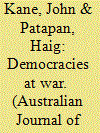

|
|
|
| 10 |
ID:
114153
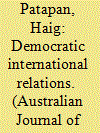

|
|
|
|
|
| Publication |
2012.
|
| Summary/Abstract |
The article examines the extent to which Montesquieu's doux commerce thesis, which claims that commerce leads to softening of manners and therefore favours international peace, presents a challenge to democratic peace theory. It argues that Montesquieu's claim that peace may be due to commerce, and not democracy, provides a theoretical challenge to those scholars who argue that there is a Kantian virtuous triangle of democracy. The practical implication of this theoretical challenge concerns the way democratic peace theory has influenced the practice of international politics, especially American foreign policy. The article argues that Montesquieu's doux commerce thesis mediates between the contending claims of realism and liberal internationalism over the merits of democratisation as an essential means for securing peace.
|
|
|
|
|
|
|
|
|
|
|
|
|
|
|
|
| 11 |
ID:
161609
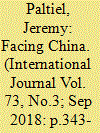

|
|
|
|
|
| Summary/Abstract |
This paper examines the challenges Canada faces in forging a diplomacy appropriate for the changing power configuration in global politics. The reshaping of the international order—with China pushing for a more hierarchical view of international relations, and the administration of Donald Trump repositioning the USA in global politics—provides Canada with the impetus to rediscover the traditional role that middle powers played as reliable middle managers for the global project. Today, such “middle management” is deprived of a reliable role. Since China has yet to articulate a coherent normative vision of a new global order, and the USA is retreating to a purely transactional view of trade and diplomacy, Canada and other middle powers have few choices other than to try to adapt to the changes in the hopes of sustaining the normative mesh that has upheld the post-war order.
|
|
|
|
|
|
|
|
|
|
|
|
|
|
|
|
| 12 |
ID:
164367
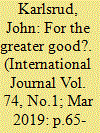

|
|
|
|
|
| Summary/Abstract |
The usual suspects of middle power internationalism—small and middle powers such as Canada, Denmark, Norway, the Netherlands, and Sweden—have all contributed to the UN peacekeeping mission in Mali (MINUSMA). This article argues that while these and other Western countries' contributions to MINUSMA may still be characterized as investments into UN peacekeeping reform and a rule-governed world order, the liberal underpinnings of that commitment are withering. Instead, these countries seek to enhance their own status. This is done by gaining appreciation for their contributions, primarily from the US; strengthening their bids for a non-permanent seat on the UN Security Council; and self-interested contributions to reform UN peacekeeping by efforts to enable it to confront violent extremism and terrorism. Paradoxically, the article concludes, when moving the UN towards counterterrorism and weakening the legitimacy of the organization, Western states undermine a cornerstone of their own security.
|
|
|
|
|
|
|
|
|
|
|
|
|
|
|
|
| 13 |
ID:
103316
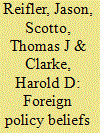

|
|
|
|
|
| Publication |
2011.
|
| Summary/Abstract |
This paper examines the structure and domestic political relevance of foreign policy beliefs in contemporary Britain. Confirmatory factor analyses (CFA) of data gathered in five national surveys conducted between May and September 2008 show that the British public's foreign policy beliefs are organized by two latent factors, which we label Liberal Internationalism and British Militarism. These factors closely resemble those reported in studies of the foreign policy beliefs of the American public. Analyses reveal significant covariation between the two foreign policy belief factors and voting intentions, as well as with partisanship and feelings about party leaders-key predictor variables in voting behavior models. These relationships remain significant in the presence of several controls, including measures of incumbent government performance in domestic and foreign policy domains. Demonstrating that foreign policy beliefs matter for the fates of political parties and their leaders helps to explain how public opinion in democratic politics affects the conduct of international relations.
|
|
|
|
|
|
|
|
|
|
|
|
|
|
|
|
| 14 |
ID:
181688
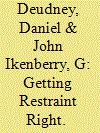

|
|
|
|
|
| Summary/Abstract |
Liberalism and its republican precursors provide the largest and best-developed body of restraint theory and practice. Realist, libertarian and other criticisms of liberalism and liberal internationalism fall short on both historical and theoretical grounds. Liberal internationalism has had a profoundly progressive – even revolutionary – impact on the modern world order, advancing the grand transition from a world of empire to a world of nation-states, building an infrastructure of rules and institutions to foster and protect liberal democracy, and generating international coalitions and projects for tackling the gravest threats to world order and humanity. Unlike the schools of thought that make up the Quincy coalition, liberal internationalism places at the centre of its vision the cooperative organisation of international order – led by the United States and other liberal democracies, allies and partners – to defend shared liberal values and manage global problems of interdependence.
|
|
|
|
|
|
|
|
|
|
|
|
|
|
|
|
| 15 |
ID:
153556
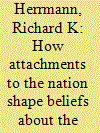

|
|
|
|
|
| Summary/Abstract |
If competing beliefs about political events in the world stem largely from information asymmetries, then more information and knowledge should reduce the gap in competing perceptions. Empirical studies of decision making, however, often find just the reverse: as knowledge and the stakes in play go up, the beliefs about what is happening polarize rather than converge. The theory proposed here attributes this to motivated reasoning. Emotions inside the observer shape beliefs along with information coming from the outside world. A series of experiments embedded in a national survey of Americans finds that a primary driver of the beliefs someone forms about globalization, other countries, and the politics in the Middle East is how strongly they attach their social identity to the United States. Attachment produces more intense positive and negative emotions that in turn shape the interpretation of unfolding events and lead norms to be applied in an inconsistent fashion. People, in effect, rewrite reality around their favored course of action, marrying the logic of appropriateness to their own preferences. Beliefs, consequently, are not independent of preferences but related to them. Motivated reasoning, while not consistent with rational models, is predictable and can lead to expensive mistakes and double standards that undermine liberal internationalism.
|
|
|
|
|
|
|
|
|
|
|
|
|
|
|
|
| 16 |
ID:
121250
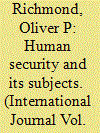

|
|
|
|
|
| Publication |
2013.
|
| Summary/Abstract |
The UN has changed the world by combining liberal internationalism,
the state, and liberal institutionalism, as well as by endeavouring to place
the subjects of security first. The notion of human security (HS) emerged
through these processes and through the convergence of various concepts,
including peacekeeping, human rights, development, and peace-building.
HS has been central to the UN's recent normative and legal impact and to
the UN's many peacekeeping and peace-building environments around the
world.
|
|
|
|
|
|
|
|
|
|
|
|
|
|
|
|
| 17 |
ID:
097756
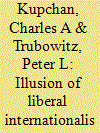

|
|
|
|
|
| Publication |
2010.
|
| Summary/Abstract |
Over the past two decades, political polarization has shaken the domestic foundations of U.S. grand strategy, sorely testing bipartisan support for liberal internationalism. Stephen Chaudoin, Helen Milner, and Dustin Tingley take issue with this interpretation, contending that liberal internationalism in the United States is alive and well. Their arguments, however, do not stand up to careful scrutiny. Their analysis of congressional voting and public opinion fails to demonstrate the persistence of bipartisanship on foreign policy. Indeed, the partisan gap that widened during George W. Bush's administration has continued during the presidency of Barack Obama, confirming that a structural change has taken place in the domestic bases of U.S. foreign policy. President Obama now faces the unenviable challenge of conducting U.S. statecraft during an era when consensus will be as elusive at home as it is globally.
|
|
|
|
|
|
|
|
|
|
|
|
|
|
|
|
| 18 |
ID:
172425
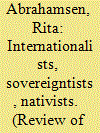

|
|
|
|
|
| Summary/Abstract |
Contrary to common assumptions that the liberal world order was ‘made in the West’, this article argues that it was produced in interaction with Pan-African ideology and actors. Developing a morphological analysis, it identifies three contending visions of world order within Pan-Africanism: a world of continental unity and transnational solidarity; a world of national sovereignty; and a world of racially defined units. It concludes that Pan-Africanism contains intellectual and political resources for the defence, reinvigoration, and invention of a more just, equal and rule-bound multilateral world, but that this cannot be taken for granted. Pan-Africanism is neither inherently progressive, nor reactionary, and can support multilateralism and sovereigntism in equal measure. Pan-Africanism's nativism also carries particular risks at a time when similar identitarian viewpoints are promoted by Radical Right movements. Understanding the manner in which Pan-Africanism informs and legitimises diverse political agendas is thus of crucial importance for IR, for Pan-Africanists, and for the future of world order.
|
|
|
|
|
|
|
|
|
|
|
|
|
|
|
|
| 19 |
ID:
164363
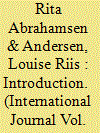

|
|
|
|
|
| Summary/Abstract |
At a time when liberal internationalism and institutions of multilateral cooperation are being dealt almost daily blows, this special issue revisits the notion and practice of middle power liberal internationalism. The introduction suggests that while liberal internationalism is far from dead, the challenges are serious and multiple. Reflecting on the seven essays contained in the volume, it argues that the biggest challenge for a future liberal internationalism is not to double-down on its normative virtues, but critically to reflect on how it can be retooled to respond to new challenges.
|
|
|
|
|
|
|
|
|
|
|
|
|
|
|
|
| 20 |
ID:
159463
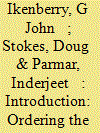

|
|
|
|
|
| Summary/Abstract |
The Trump presidency appears to personify, along with Britain's vote to withdraw from the European Union, a sense of deep crisis in the United States-led liberal international order (LIO). The two states that conceived and constructed a whole array of international institutions after 1945 now seem to be rejecting that order, or at the very least, demanding that its institutions either be reformed or recalibrated to better suit their purposes. However, both developments may signal a new phase in the evolution of the international system—more nationalistic, state-centric and transactional, in which costs and responsibilities are more widely shared and where the electorate questions the costs versus benefits of the postwar liberal consensus. This crisis has long been evident
|
|
|
|
|
|
|
|
|
|
|
|
|
|
|
|
|
|
|
|
|